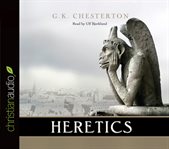Nonfiction
eAudiobook
Details
PUBLISHED
EDITION
DESCRIPTION
1 online resource (1 audio file (6hr., 54 min.)) : digital
ISBN/ISSN
LANGUAGE
NOTES
Read by Ulf Bjorklund
Nothing more strangely indicates an enormous and silent evil of modern society than the extraordinary use, which is made nowadays of the word "orthodox". In former days, the heretic was proud of not being a heretic. It was the kingdoms of the world and the police and the judges who were heretics. He was orthodox. He had no pride in having rebelled against them; they had rebelled against him. The armies with their cruel security, the kings with their cold faces, the decorous processes of State, the reasonable processes of law--all these like sheep had gone astray. The man was proud of being orthodox, was proud of being right. If he stood alone in a howling wilderness he was more than a man; he was a church. He was the centre of the universe; it was round him that the stars swung. All the tortures torn out of forgotten hells could not make him admit that he was heretical. But a few modern phrases have made him boast of it. He says, with a conscious laugh, "I suppose I am very heretical," and looks round for applause. The word "heresy" not only means no longer being wrong; it practically means being clear-headed and courageous. The word "orthodoxy" not only no longer means being right; it practically means being wrong. All this can mean one thing and one thing only. It means that people care less for whether they are philosophically right
Mode of access: World Wide Web







